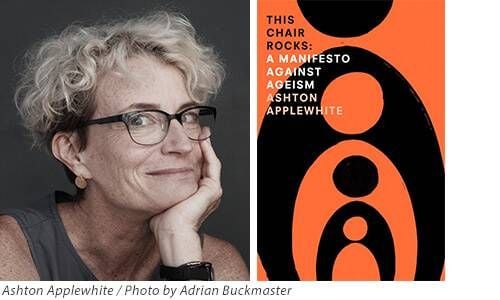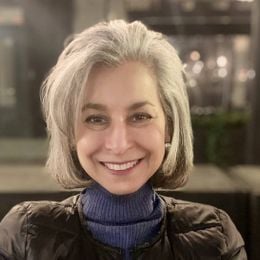How to Swap Ageism for Age Pride
'This Chair Rocks' author Ashton Applewhite on how to fight age discrimination
Ashton Applewhite is on a mission to dismantle ageism: both the discrimination we face and the kind we inflict on ourselves when we internalize negative myths and stereotypes. Sexism and racism no longer get a pass, she points out; isn’t it high time to make discrimination on the basis of age just as unacceptable?
Read her new book, This Chair Rocks: A Manifesto Against Ageism, check out her blog “Yo, Is this Ageist?” or catch her giving a live talk, and you won’t feel the same about comments like, “You look great for your age.” You could also read the Next Avenue article about her one-woman show, This Chair Rocks. You’ll find yourself picking up her sticky phrasing, like swapping "olders" (as opposed to "youngers") for "seniors," a term no one actually likes. (Below is a short video of Applewhite, 63, talking about why this language works well.)
A pioneer in the nascent anti-ageism movement, Applewhite has plenty of suggestions for how to re-envision the years ahead and work together towards an all-age-friendly world — such as increasing opportunities for civic engagement, training people for longer working lives, including olders (can’t help myself there) in clinical trials and incentivizing more people to go into geriatrics. She is the kind of charismatic leader that movements need — armed with cold hard facts, snappy comebacks and creativity — like dying her hair white in a statement of “age pride.”
Applewhite’s book will be published on March 15. We chatted over email as she prepared for the release. Highlights:
What's your advice to those who hit a milestone birthday — usually the ones starting with 50 — and feel increasingly invisible, irrelevant and written off by a youth-infatuated culture?
Ashton Applewhite: If only it started at 50! Women freak out at being “over the hill” at 30 and guys in Silicon Valley have plastic surgery at 40 — God forbid they look like they have two kids and a mortgage! My advice is to think about what it actually feels like to be that age, and compare the experience to the way it’s portrayed in the culture — in birthday cards, for example. What I hear over and over—and it’s certainly true to my experience at 63 — is that these decades trump our insecure 20s and stressed-out 30s in so many ways. Why allow ourselves to be bushwhacked by needless dread? Why not draw comfort and strength from the evidence all around us that older people have plenty to say and to contribute?
We can’t stop aging, even if we wanted to. What we can change is the way we feel about it — the first step in any revolution. Then we can begin to see where those ageist messages come from, and the commercial and political purposes they serve. Then, we can work together to dismantle the last socially sanctioned prejudice, as we have with racism and sexism and homophobia.
Your book cover isn't just a great-looking piece of abstract art. What were you trying to capture there? We gave brilliant designer and friend Rebeca Mendez a tough commission: Come up with a cover that feels warm and human but also sharply political. And will jump out at readers from a crowded bookstore window. She was scratching her head until my partner suggested the book’s epigraph as inspiration. It’s a quote from writer Anne Lamott: “We contain all the ages we have ever been.” Rebeca’s painting beautifully captures that idea.

An ageist society aspires to “agelessness,” an artificial and unattainable goal that strips us of our years. I love the way the cover represents the opposite, which I call “agefulness” — a rich accretion of all the things we’ve done and been, stored within our bones and brains, that makes us who we are.
Tell us how an anti-ageism campaign can be a public-health initiative.
Every few weeks there seems to be a new story about how attitudes towards aging affect the way older minds and bodies function — at the cellular level. People with more positive views of aging do better on memory tests, walk faster and are more likely to fully recover from severe disability. And they actually live an average of seven and a half years longer. Those who think of aging as illness and decline, on the other hand, are less likely to seek healthcare or to exercise, and they die earlier.
We also know that some people seem to escape cognitive decline well into their 90s and beyond. What do they have in common? A positive attitude toward aging, and a sense of purpose. We don’t know how to define Alzheimer’s, let alone cure it, so preventive measures make sense: helping older people stay engaged and purposeful. What's the biggest obstacle? The pervasive ageism that sidelines and segregates older member Americans, making it infinitely harder to find meaning and purpose in late life.
Health has the biggest effect on how we age — and how much it costs. Better attitudes toward aging, better health. Think what a national anti-ageism campaign would do to extend not just the lifespan but the 'healthspan' of all Americans.
You say the time is ripe for a radical anti-ageist movement. What kind of actions are you suggesting?
I’m asking people to wake up to the ageism in and around us, embrace a more nuanced and accurate view of growing older, cheer up and push back. What ideas about aging have each of us internalized without even realizing it? How do they play out across our lives — from boardroom to bedroom, in muscle and memory — and what changes inside us once we perceive these destructive forces at work? What might an age-friendly world — friendly to all ages, that is — look like? What can we do, individually and collectively, to provoke the necessary shift in consciousness, and catalyze a radical age movement to make it happen? My book lays out a blueprint.
If this new movement had a slogan, what would it to be?
Age pride! Age pride is for dissed teenagers and dismissed olders and everyone in between. Age pride is for Maggie Kuhn, founder of the Gray Panthers, who said, 'We must be proud of our age,' and who, if she’d lived long enough, would have beaten me to 'Occupy age!' — my other favorite slogan. Age pride is for everyone who refuses to regret waking up a day older, who acknowledges long life as the privilege it is, and who is prepared to challenge the power structures that underlie all discrimination. We are all aging. Everyone benefits when we make common cause against oppression. Age pride is for everyone.


